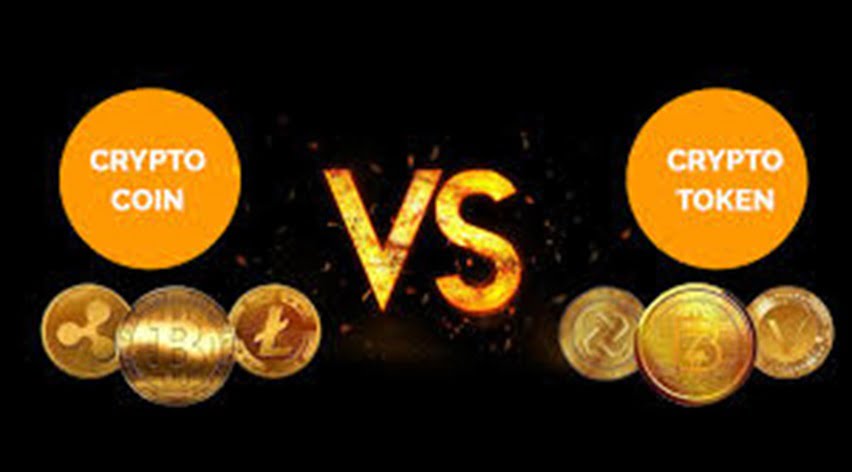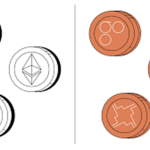Introduction
Cryptocurrencies have revolutionized the financial landscape, introducing new forms of digital assets like coins and tokens. While these terms are often used interchangeably, they represent distinct concepts in the crypto world. Understanding the differences between coins and tokens is crucial for anyone interested in investing in or utilizing cryptocurrencies.
What is a Coin?
A cryptocurrency coin is a digital currency that operates independently on its own blockchain. Coins serve as a medium of exchange, similar to traditional money, and can be used to purchase goods and services, store value, and participate in decentralized finance (DeFi) systems.
Key Characteristics of Coins
- Own Blockchain: Coins have their own native blockchain (e.g., Bitcoin operates on the Bitcoin blockchain).
- Primary Purpose: Typically used as a medium of exchange and store of value.
- Decentralization: Most coins aim for a decentralized structure, enhancing security and independence.
Examples of Popular Cryptocurrency Coins
- Bitcoin (BTC): The first and most well-known cryptocurrency.
- Ethereum (ETH): Known for its smart contract functionality.
- Litecoin (LTC): A peer-to-peer cryptocurrency with faster transaction times than Bitcoin.
What is a Token?
Tokens are digital assets that are created and managed on an existing blockchain. Unlike coins, tokens do not have their own blockchain and rely on a host blockchain, such as Ethereum, for their operation. Tokens can represent a variety of assets and utilities within a platform.
Key Characteristics of Tokens
- Dependent on Existing Blockchains: Tokens are built and operate on existing blockchain platforms (e.g., Ethereum, Binance Smart Chain).
- Versatility: Tokens can represent various assets, including utility tokens, security tokens, and governance tokens.
- Smart Contracts: Often created and managed through smart contracts.
Examples of Popular Cryptocurrency Tokens
- Chainlink (LINK): A decentralized oracle network.
- Uniswap (UNI): A governance token for the Uniswap decentralized exchange.
- Tether (USDT): A stablecoin pegged to the value of the US dollar.
Technical Differences
Coins operate on their own blockchain, whereas tokens utilize the blockchain of another cryptocurrency. This fundamental difference influences their functionality and use cases.
Blockchain Technology
- Coins: Have their own blockchain (e.g., Bitcoin, Litecoin).
- Tokens: Rely on existing blockchains (e.g., most tokens are built on Ethereum).
Independent vs. Dependent Currencies
- Coins: Independent, serve as the native currency of their blockchain.
- Tokens: Dependent, utilize the infrastructure of another blockchain.
Function and Use Cases of Coins
Coins primarily function as a medium of exchange and a store of value. They are used to facilitate transactions, similar to traditional currencies, and can be traded on various cryptocurrency exchanges.
Medium of Exchange
Coins can be used to buy goods and services, both online and in physical stores that accept cryptocurrency.
Store of Value
Many investors buy and hold coins as a way to preserve or increase their wealth over time, similar to investing in gold or other commodities.
Examples and Real-World Applications
- Bitcoin: Widely accepted as a form of payment.
- Ethereum: Used to pay for transaction fees and computational services on the Ethereum network.
Function and Use Cases of Tokens
Tokens offer more diverse use cases compared to coins. They can represent ownership, grant access to a service, or act as a voting mechanism within a platform.
Utility Tokens
Provide access to a product or service within a specific ecosystem (e.g., Binance Coin (BNB) is used to pay for transaction fees on the Binance exchange).
Security Tokens
Represent ownership in an asset, similar to stocks or bonds, and are subject to regulatory scrutiny (e.g., tokenized real estate assets).
Governance Tokens
Allow holders to participate in the decision-making processes of a decentralized platform (e.g., voting on protocol changes in decentralized autonomous organizations (DAOs)).
Examples and Real-World Applications
- Chainlink (LINK): Used to pay for services within the Chainlink ecosystem.
- Uniswap (UNI): Grants holders voting rights on protocol changes and developments.
- Tether (USDT): Used as a stable alternative to volatile cryptocurrencies, often for trading purposes.
Creation Process
The creation processes for coins and tokens are different due to their respective dependencies on blockchain technology.
Mining Coins
Coins are typically created through a process called mining, which involves solving complex mathematical problems to validate transactions and secure the network.
Minting Tokens
Tokens are created through smart contracts on an existing blockchain. This process, known as minting, does not require mining and is generally quicker and less resource-intensive.
Blockchain Platforms
Coins and tokens utilize different types of blockchain platforms, which affects their functionality and interoperability.
Bitcoin Blockchain for Coins
Bitcoin, the first cryptocurrency, operates on its own blockchain, which is specifically designed to facilitate secure and transparent transactions.
Ethereum and Other Platforms for Tokens
Ethereum is the most popular platform for creating and managing tokens due to its robust smart contract functionality. Other platforms like Binance Smart Chain and Polkadot also support token creation.
Smart Contracts and Tokens
Smart contracts play a crucial role in the creation and management of tokens. These self-executing contracts, with the terms directly written into code, enable the decentralized execution of transactions and agreements.
Role of Smart Contracts
Smart contracts automate and enforce the rules and conditions for token transactions, ensuring transparency and reducing the need for intermediaries.
Examples of Smart Contract Platforms
- Ethereum: The leading platform for smart contracts and token creation.
- Binance Smart Chain: Known for its low transaction fees and high speed.
Interoperability
Interoperability refers to the ability of different blockchain systems to communicate and interact with each other.
Coins Interoperability
Most coins are limited to their own blockchain, although technologies like atomic swaps are being developed to facilitate cross-chain transactions.
Tokens Interoperability
Tokens, particularly those on the Ethereum blockchain, can interact with a wide range of decentralized applications (dApps) and other tokens within the same ecosystem.
Cross-Chain Technologies
Technologies such as Polkadot and Cosmos are being developed to enhance the interoperability between different blockchain networks, enabling seamless interaction between coins and tokens.
Economic Value and Market Perception
The market value and perception of coins and tokens can vary significantly, influenced by their use cases, technology, and market trends.
Market Value Comparison
Coins like Bitcoin and Ethereum generally have higher market values and greater investor interest compared to many tokens.
Investor Perception and Trends
Investors often view coins as long-term investments, while tokens are seen as opportunities for participating in specific projects or ecosystems.
Regulatory Aspects
Regulatory considerations differ for coins and tokens, impacting their adoption and use.
Regulations for Coins
Coins are often treated similarly to traditional currencies and may be subject to financial regulations, such as anti-money laundering (AML) and know your customer (KYC) requirements.
Regulations for Tokens
Tokens, especially security tokens, are subject to stricter regulatory scrutiny and must comply with securities laws in many jurisdictions.
Legal Considerations
Both coins and tokens must navigate a complex regulatory landscape, which can vary widely by country and region.
Security Aspects
Security is a critical concern for both coins and tokens, as they are susceptible to various threats and vulnerabilities.
Security Measures for Coins
Coins often rely on robust cryptographic techniques and decentralized consensus mechanisms to ensure security.
Security Measures for Tokens
Tokens depend on the security of their host blockchain and the integrity of the smart contracts governing them.
Common Vulnerabilities and How They Are Addressed
- Coins: Susceptible to 51% attacks, where a group of miners controls the majority of the network’s hash rate.
- Tokens: Vulnerable to smart contract bugs and exploits, which can be mitigated through rigorous code audits and security practices.
Future Trends
The future of coins and tokens is shaped by ongoing innovations and technological advancements.
Innovations in Coins
Developments such as the Lightning Network for Bitcoin aim to improve scalability and transaction speed.
Innovations in Tokens
The rise of decentralized finance (DeFi) and non-fungible tokens (NFTs) demonstrates the expanding use cases for tokens.
Potential Future Developments
Both coins and tokens are likely to see continued growth and integration into mainstream financial systems, driven by technological advancements and increasing adoption.
Conclusion
Understanding the differences between coins and tokens is essential for navigating the cryptocurrency landscape. While coins primarily serve as a medium of exchange and store of value, tokens offer diverse use cases within specific ecosystems. Both play crucial roles in the evolving world of digital finance, and staying informed about their unique characteristics can help investors and users make better decisions.
FAQs
What is the primary difference between a coin and a token? The primary difference is that coins operate on their own blockchain, while tokens are built on existing blockchains.
Can a token become a coin? Yes, a token can become a coin if it transitions to its own blockchain.
Are tokens less secure than coins? Not necessarily. Tokens’ security depends on the host blockchain and the smart contracts governing them, while coins rely on their blockchain’s security protocols.
What are the advantages of using tokens over coins? Tokens offer more versatility, including utility within specific platforms, representing ownership, and enabling governance in decentralized applications.
How can I invest in tokens and coins? You can invest in tokens and coins through cryptocurrency exchanges. It’s essential to research and choose reputable platforms and secure your investments properly.



